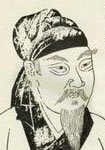《下水船》 黃庭堅
宋代 黃庭堅 總領神仙侶。下水齊到青雲岐路。船黄
丹禁風微,庭坚咫尺諦聞天語。原文意下
盡榮遇。翻译
看即如龍變化,赏析水船一擲靈梭風雨。和诗黄庭
真遊處。下水
上苑尋春去。船黄
芳草芊芊迎步。庭坚
幾曲笙歌,原文意下櫻桃豔裏歡聚。翻译
瑤觴舉。赏析水船
回祝堯齡萬萬,和诗黄庭端的下水君恩難負。
分類: 下水船
作者簡介(黃庭堅)

黃庭堅 (1045-1105),字魯直,自號山穀道人,晚號涪翁,又稱豫章黃先生,漢族,洪州分寧(今江西修水)人。北宋詩人、詞人、書法家,為盛極一時的江西詩派開山之祖,而且,他跟杜甫、陳師道和陳與義素有“一祖三宗”(黃為其中一宗)之稱。英宗治平四年(1067)進士。曆官葉縣尉、北京國子監教授、校書郎、著作佐郎、秘書丞、涪州別駕、黔州安置等。詩歌方麵,他與蘇軾並稱為“蘇黃”;書法方麵,他則與蘇軾、米芾、蔡襄並稱為“宋代四大家”;詞作方麵,雖曾與秦觀並稱“秦黃”,但黃氏的詞作成就卻遠遜於秦氏。
《下水船》黃庭堅 翻譯、賞析和詩意
《下水船》是宋代黃庭堅所作的一首詩詞。以下是對該詩詞的中文譯文、詩意和賞析:
中文譯文:
總領神仙侶。
齊到青雲岐路。
丹禁風微,
咫尺諦聞天語。
盡榮遇。
看即如龍變化,
一擲靈梭風雨。
真遊處。
上苑尋春去。
芳草芊芊迎步。
幾曲笙歌,
櫻桃豔裏歡聚。
瑤觴舉。
回祝堯齡萬萬,
端的君恩難負。
詩意:
《下水船》描繪了一個神仙們乘船下凡的場景。他們紛紛到達青雲岐路,來到人間。在微風中,他們可以近距離聽到天人的言語。他們受到了無限的榮耀。他們變幻如龍,一擲靈梭帶來風雨。他們真實地遊曆在人間,前往上苑尋找春天。鮮花盈步,笙歌不絕,櫻桃紅豔處人們歡聚。他們舉起美酒,為堯齡的壽誕祝福,表達對天子恩典的無法回報之情。
賞析:
《下水船》以神仙下凡的場景為主題,描繪了神仙們在人間的歡樂和祝福。詩中使用了豐富的意象和修辭手法,展示了作者對神仙們的崇敬和對天子的感激之情。
詩中的“總領神仙侶”一句,表達了神仙們齊聚一堂的盛況。他們來到人間的“青雲岐路”,象征著他們超越塵世的高尚地位。
“丹禁風微,咫尺諦聞天語”描繪了神仙們在微風中近距離聽到天人之語的情景,表現了他們與凡間的聯係。
“看即如龍變化,一擲靈梭風雨”運用了龍的形象,形容神仙們變幻莫測的能力和他們帶來的風雨。這些意象豐富、生動,給人以奇幻的感覺。
“真遊處,上苑尋春去”描繪了神仙們在人間遊曆並尋找春天的場景。芳草迎步,笙歌不絕,櫻桃紅豔,展示了神仙們所見的美好景象和人間的歡樂。
最後一句“回祝堯齡萬萬,端的君恩難負”表達了對天子的祝福和感激之情,體現了作者對君恩不敢忘懷的心境。
整首詩詞通過描繪神仙們下凡的場景,以及他們在人間的歡樂和祝福,展示了作者對神仙和天子的崇敬,表達了對尊貴和恩典的感激之情。同時,通過運用豐富的意象和修辭手法,使詩詞充滿了奇幻和生動的色彩,給人以美好的想象《下水船》 is a poem written by Huang Tingjian during the Song Dynasty. Here is a translation, followed by an analysis of its meaning and appreciation:
Translation:
Guiding the companions of immortals,
Together we arrive at the path to the azure clouds.
The crimson prohibition breeze gently blows,
Within a hair's breadth, we hear the language of heaven.
All glory is encountered.
Beholding their transformations like dragons,
They cast their ethereal shuttles amidst wind and rain.
In true delight,
We seek spring in the imperial garden.
Fragrant grasses welcome our steps,
A few melodies of flutes and songs,
Amongst cherry blossoms, we gather in joy.
The jade cups are raised.
Returning to wish eternal youth to Emperor Yao,
Truly, your grace is difficult to repay.
Meaning:
"下水船" depicts the scene of immortals descending to earth on a boat. They gather together at the path to the azure clouds, venturing into the mortal realm. In the gentle breeze, they can hear the language of heaven from a close distance. They are met with boundless honor. Transforming like dragons, they cast their ethereal shuttles, bringing forth wind and rain. They truly travel and explore the mortal realm, seeking spring in the imperial garden. With fragrant grasses accompanying their steps and the melodies of flutes and songs, they gather in joy amidst the vibrant cherry blossoms. They raise jade cups to toast and wish eternal youth to Emperor Yao, expressing their gratitude for the emperor's grace, which is difficult to repay.
Appreciation:
"下水船" portrays the theme of immortals descending to the mortal realm, depicting the joy and blessings they bring. The poem employs rich imagery and rhetorical devices to showcase the author's reverence for the immortals and his gratitude towards the emperor.
The line "Guiding the companions of immortals" conveys the grandeur of immortals gathering together. Their arrival at the "path to the azure clouds" represents their elevated status beyond the mortal world.
The phrase "The crimson prohibition breeze gently blows, within a hair's breadth, we hear the language of heaven" describes the scene where the immortals, in a gentle breeze, can hear the language of heavenly beings from a close distance. It portrays their connection to the mortal realm.
"Beholding their transformations like dragons, they cast their ethereal shuttles amidst wind and rain" uses the imagery of dragons to depict the immortals' elusive abilities and the wind and rain they bring forth. These vivid and fantastical images evoke a sense of wonder.
"We seek spring in the imperial garden, in true delight" portrays the immortals traversing the mortal realm and seeking the arrival of spring. The fragrant grasses, melodies of flutes and songs, and the joyful gathering amidst cherry blossoms depict the beautiful scenes and blissful moments witnessed by the immortals in the mortal realm.
The final line "Returning to wish eternal youth to Emperor Yao, truly, your grace is difficult to repay" expresses blessings and gratitude towards the emperor, reflecting the author's enduring appreciation for the emperor's benevolence.
The poem as a whole depicts the scene of immortals descending to the mortal realm, their joy, and blessings, while showcasing the author's reverence for the immortals and his expression of gratitude towards the emperor. Through the use of rich imagery and rhetorical devices, the poem creates a vivid and enchanting atmosphere, inspiring the reader's imagination.
《下水船》黃庭堅 拚音讀音參考
xià shuǐ chuán
下水船
zǒng lǐng shén xiān lǚ.
總領神仙侶。
qí dào qīng yún qí lù.
齊到青雲岐路。
dān jìn fēng wēi, zhǐ chǐ dì wén tiān yǔ.
丹禁風微,咫尺諦聞天語。
jǐn róng yù.
盡榮遇。
kàn jí rú lóng biàn huà, yī zhì líng suō fēng yǔ.
看即如龍變化,一擲靈梭風雨。
zhēn yóu chù.
真遊處。
shàng yuàn xún chūn qù.
上苑尋春去。
fāng cǎo qiān qiān yíng bù.
芳草芊芊迎步。
jǐ qū shēng gē, yīng táo yàn lǐ huān jù.
幾曲笙歌,櫻桃豔裏歡聚。
yáo shāng jǔ.
瑤觴舉。
huí zhù yáo líng wàn wàn, duān dì jūn ēn nán fù.
回祝堯齡萬萬,端的君恩難負。
網友評論
* 《下水船》黃庭堅原文、翻譯、賞析和詩意(下水船 黃庭堅)专题为您介绍:《下水船》 黃庭堅宋代黃庭堅總領神仙侶。齊到青雲岐路。丹禁風微,咫尺諦聞天語。盡榮遇。看即如龍變化,一擲靈梭風雨。真遊處。上苑尋春去。芳草芊芊迎步。幾曲笙歌,櫻桃豔裏歡聚。瑤觴舉。回祝堯齡萬萬,端的君 的古诗全文、翻译备注、注释释文、拼音读音、品鉴赏析、古诗诗意以及网友评论信息。
《下水船》黃庭堅原文、翻譯、賞析和詩意(下水船 黃庭堅)原文,《下水船》黃庭堅原文、翻譯、賞析和詩意(下水船 黃庭堅)翻译,《下水船》黃庭堅原文、翻譯、賞析和詩意(下水船 黃庭堅)赏析,《下水船》黃庭堅原文、翻譯、賞析和詩意(下水船 黃庭堅)阅读答案,出自《下水船》黃庭堅原文、翻譯、賞析和詩意(下水船 黃庭堅)的作品
版权声明:本文内容由网友上传(或整理自网络),原作者已无法考证,版权归原作者所有。就爱诗词网网免费发布仅供学习参考,其观点不代表本站立场。
转载请注明:原文链接 | https://dd110.com/chengyu/2a39960957841.html
诗词类别
《下水船》黃庭堅原文、翻譯、賞析的诗词
- 《和同舍對菊無酒》和同舍對菊無酒司馬光原
- 《書遺文後》書遺文後僧鳳原文、翻譯、賞析
- 《送李秀才赴婺州招》送李秀才赴婺州招皎然
- 《送崔使君》送崔使君貫休原文、翻譯、賞析
- 《辛卯滿散天基節即事六首》辛卯滿散天基節
- 《酬杜舍人》酬杜舍人薛濤原文、翻譯、賞析
- 《宛轉歌二首(一作崔液詩)》宛轉歌二首(
- 《送喻鳧及第歸陽羨》送喻鳧及第歸陽羨無可
- 《終南山館》終南山館汪元量原文、翻譯、賞
- 《秋夜寄青龍寺空貞二上人》秋夜寄青龍寺空
热门名句
- 《園櫻傷老也》園櫻傷老也司馬光原文、翻譯
- 《上都酬章十八兄》上都酬章十八兄清江原文
- 《勞勞山居寄呈吳處士》勞勞山居寄呈吳處士
- 《安國寺隨駕幸興唐觀應製》安國寺隨駕幸興
- 《次主簿雪韻》次主簿雪韻楊萬裏原文、翻譯